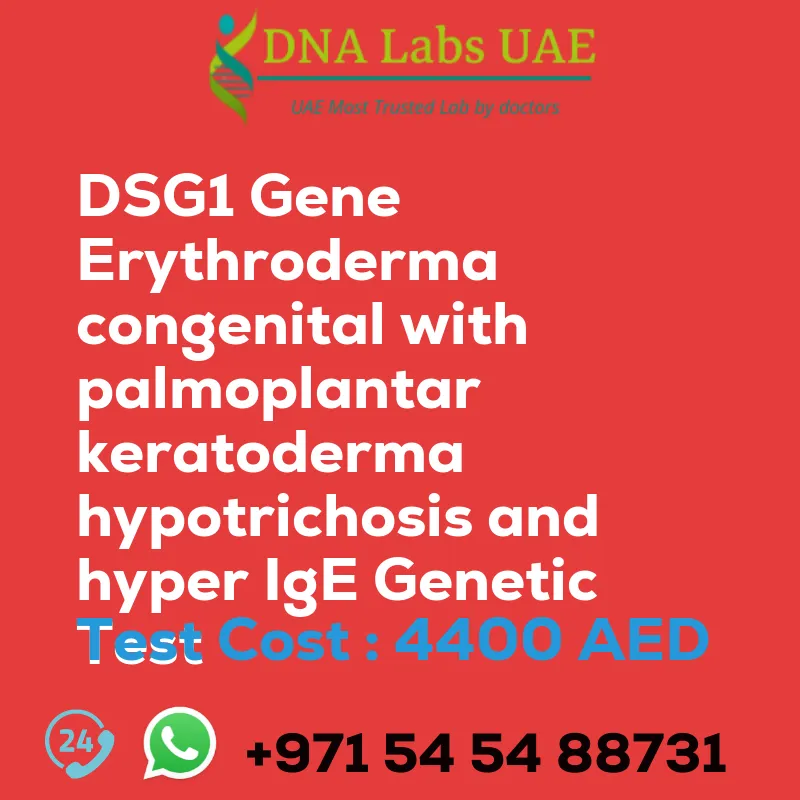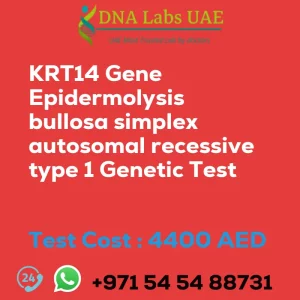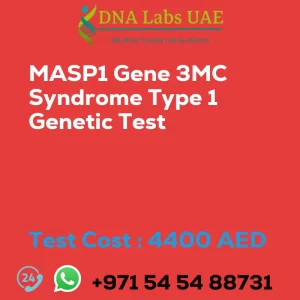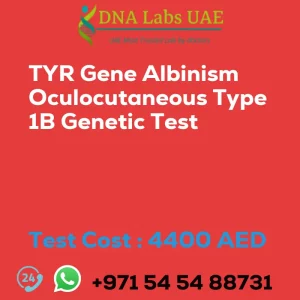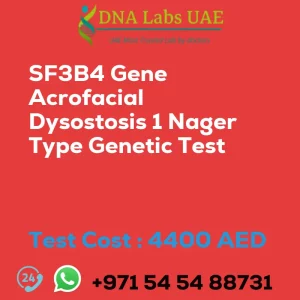DSG1 Gene Erythroderma congenital with palmoplantar keratoderma hypotrichosis and hyper IgE Genetic Test
Test Name: DSG1 Gene Erythroderma congenital with palmoplantar keratoderma hypotrichosis and hyper IgE Genetic Test
Components: DSG1 gene erythroderma, congenital, with palmoplantar keratoderma, hypotrichosis, and hyper IgE
Price: 4400.0 AED
Sample Condition: Blood or Extracted DNA or One drop Blood on FTA Card
Report Delivery: 3 to 4 Weeks
Method: NGS Technology
Test type: Osteology Dermatology Immunology Disorders
Doctor: Dermatologist
Test Department: Genetics
Pre Test Information: Clinical History of Patient who is going for DSG1 Gene Erythroderma, congenital, with palmoplantar keratoderma, hypotrichosis and hyper IgE NGS Genetic DNA Test. A Genetic Counselling session to draw a pedigree chart of family members affected with DSG1 Gene Erythroderma, congenital, with palmoplantar keratoderma, hypotrichosis and hyper IgE NGS Genetic DNA Test gene DSG1
Test Details: DSG1 gene erythroderma, congenital, with palmoplantar keratoderma, hypotrichosis, and hyper IgE is a rare genetic disorder characterized by several symptoms. Erythroderma refers to a widespread redness and scaling of the skin, while palmoplantar keratoderma is a thickening of the skin on the palms and soles. Hypotrichosis refers to sparse or absent hair, and hyper IgE indicates elevated levels of immunoglobulin E, which is associated with allergic reactions.
NGS genetic testing, also known as next-generation sequencing, is a diagnostic tool used to analyze the DNA sequence of specific genes. In the case of DSG1 gene erythroderma, congenital, with palmoplantar keratoderma, hypotrichosis, and hyper IgE, NGS genetic testing can identify mutations or variations in the DSG1 gene that are responsible for causing the disorder. By identifying these genetic changes, NGS genetic testing can help confirm a diagnosis and provide valuable information for genetic counseling, treatment planning, and management of the condition. It can also be used for carrier testing and prenatal diagnosis in families with a known history of the disorder.
It’s important to note that while NGS genetic testing can provide valuable insights into the genetic basis of a condition, it may not be available in all healthcare settings and may not be covered by insurance. Additionally, the interpretation of genetic test results should always be done in consultation with a qualified healthcare professional or genetic counselor.
| Test Name | DSG1 Gene Erythroderma congenital with palmoplantar keratoderma hypotrichosis and hyper IgE Genetic Test |
|---|---|
| Components | |
| Price | 4400.0 AED |
| Sample Condition | Blood or Extracted DNA or One drop Blood on FTA Card |
| Report Delivery | 3 to 4 Weeks |
| Method | NGS Technology |
| Test type | Osteology Dermatology Immunology Disorders |
| Doctor | Dermatologist |
| Test Department: | Genetics |
| Pre Test Information | Clinical History of Patient who is going for DSG1 Gene Erythroderma, congenital, with palmoplantar keratoderma, hypotrichosis and hyper IgE NGS Genetic DNA Test. A Genetic Counselling session to draw a pedigree chart of family members affected with DSG1 Gene Erythroderma, congenital, with palmoplantar keratoderma, hypotrichosis and hyper IgE NGS Genetic DNA Test gene DSG1 |
| Test Details |
DSG1 gene erythroderma, congenital, with palmoplantar keratoderma, hypotrichosis, and hyper IgE is a rare genetic disorder characterized by several symptoms. Erythroderma refers to a widespread redness and scaling of the skin, while palmoplantar keratoderma is a thickening of the skin on the palms and soles. Hypotrichosis refers to sparse or absent hair, and hyper IgE indicates elevated levels of immunoglobulin E, which is associated with allergic reactions. NGS genetic testing, also known as next-generation sequencing, is a diagnostic tool used to analyze the DNA sequence of specific genes. In the case of DSG1 gene erythroderma, congenital, with palmoplantar keratoderma, hypotrichosis, and hyper IgE, NGS genetic testing can identify mutations or variations in the DSG1 gene that are responsible for causing the disorder. By identifying these genetic changes, NGS genetic testing can help confirm a diagnosis and provide valuable information for genetic counseling, treatment planning, and management of the condition. It can also be used for carrier testing and prenatal diagnosis in families with a known history of the disorder. It’s important to note that while NGS genetic testing can provide valuable insights into the genetic basis of a condition, it may not be available in all healthcare settings and may not be covered by insurance. Additionally, the interpretation of genetic test results should always be done in consultation with a qualified healthcare professional or genetic counselor. |

